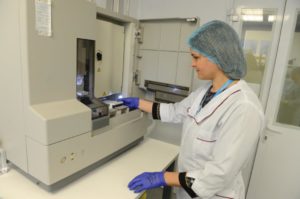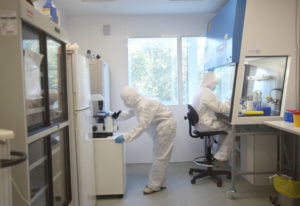A Brief History of the Laboratory

Head of the laboratory I.N. Isakova-Sivak during the work on the genetic analyzer ABI 3130xl
A significant part of the work of the department of virology is the study of influenza immunity. These studies of a fundamental and applied nature have been headed by A. N. Naikhin, MD, Ph.D., D.Sci, Professor until 2016. Under the guidance of Professor A.N. Naikhin were studied the mechanisms for the formation of an adaptive immune response to immunization with both seasonal variants of live influenza vaccine and potentially pandemic vaccines were studied. Particular attention was paid to the study of the induction of local mucosal immunity – an important element of the immune defense of the population from the influenza virus. Another important area of the immunological plan is the study of the cellular immune response to influenza A viruses. Modern approaches have been developedd in the laboratory to detect various subpopulations of virus-specific immunocompetent cells by flow cytometry. The available equipment and high qualifications of the laboratory researchers allow us to conduct studies of antiviral immunity at a level that meets international standards.
Since 2015, the laboratory has been developing the design of recombinant vector vaccines using vaccine strains of live influenza vaccine as a viral vector. These studies open up broad prospects for the use of a new vector system for constructing a new generation of vaccines against a wide range of diseases of both infectious and non-infectious nature (viral, bacterial, chlamydial infections, as well as various types of tumors), for which the most effective immunodominant epitopes have already been identified and studied. B and T cells.
The main areas of research
- Fundamental research aimed at optimizing the properties of a live influenza vaccine, expanding its spectrum of action in relation to drifed variants of circulating influenza viruses, as well as potentially pandemic variants.
- A comprehensive study of the adaptive immune response to the introduction of influenza and vector vaccines both in experimental models and in clinical trials with volunteers, the design of recombinant vector vaccines.
Main scientific results over the past 5 years

Researchers Matiushenko V.A. and Krytikova E.V. in the high-tech laboratory complex
As part of the study of the mechanisms of the formation of an adaptive immune response to immunization with a live influenza vaccine, an enzyme immunoassay test system were developed and widely tested for the quantitative detection of local antibodies of different isotypes in the secrets of the upper respiratory tract and in saliva. The relationship between the local and systemic humoral immune response in influenza patients and vaccinated people is characterized. In comparative terms, the ability of a live influenza vaccine and inactivated vaccine, administered parenterally, intranasally and orally, to stimulate a local immune response in humans has been studied. Data on age-related differences in the post-vaccination induction of local anti-influenza immunity are obtained. A technique for determining the avidity of local antibodies has been developed. Based on this technique, a study was carried out testifying to the ability of a live influenza vaccine to increase the avidity of these antibodies in humans. The quantitative characteristics of heterosubtipic local humoral immunity in humans against influenza A viruses of humans and birds are obtained. Using the method of flow cytometry, a detailed characteristic of quantitative changes in the level of circulating virus-specific CD4 + and CD8 + T cells of immunological memory in individuals immunized with various live influenza vaccines: seasonal, pandemic A (H1N1) pdm 2009, reserve vaccines prepared from avian influenza A viruses (H5N2), A (H7N3) and A (H7N9) was formed.
An experimental mouse model, which had been developed in the laboratory, makes possible to study the cellular local immune response to influenza viruses in naso-associated lymphoid tissue in mice. The ability of a live influenza vaccine to actively stimulate in it local virus-specific CD4 + and CD8 + T cells of immunological memory, the shelf life of which is at least three months (observation period) is shown. At the same time, parenteral vaccination of animals with an inactivated virus does not induce these cells in naso-associated lymphoid tissue. The role of the NP gene in the induction of cross-protective properties was analyzed and new candidates for vaccine strains for live influenza vaccine having the genome formula 5: 3 instead of the existing 6: 2 were constructed. The results of preclinical studies have confirmed the need to include the NP gene of a wild type virus to the reassortant vaccine candidate.
